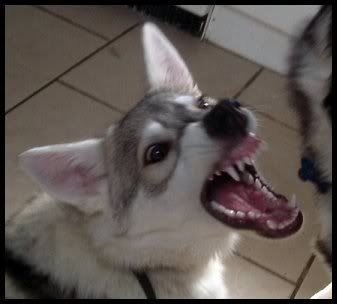Dog aggression – what can I do about it?Dog aggression – what can I do about it?
Dog aggression – what can I do about it?
It’s just pretty easy to tell when your dog’s nervy and uneasy when around strange people. The more types and different classes of people and animals he meets (babies, toddlers, teenagers, old people, men, women, people wearing uniforms, people wearing motorcycle helmets, people carrying umbrellas, etc) in a fun and relaxed context, the more at ease and happy – and safe around strangers - he’ll be in general. This is the secret to socializing your dog.
- Aggression towards strangers
- What is it?
It’s pretty easy to tell when a dog’s nervy around strange people. He’s jumpy and on the alert: either he can’t sit still and is constantly fidgeting, leaping at the smallest sound, and pacing around barking and whining; or he’s very still indeed, sitting rock-steady in one place, staring hard at the object of his suspicions (a visitor, the mailman, someone approaching him on the street while he’s tied up outside a store.) 
Why does it happen? There’s one major reason why a dog doesn’t like strange people: he’s never had the chance to get used to them. Remember, your dog relies 100% on you to broaden his horizons for him: without being taken on lots of outings to see the world and realize for himself, through consistent and positive experiences, that the unknown doesn’t necessarily equal bad news for him, how can he realistically be expected to relax in an unfamiliar situation?
What can I do about it?
The process of accustoming your dog to the world and all the strange people (and animals) that it contains is called socialization. This is an incredibly important aspect of your dog’s upbringing: in fact, it’s pretty hard to overemphasize just how important it is. Socializing your dog means exposing him from a young age (generally speaking, as soon as he’s had his vaccinations) to a wide variety of new experiences, new people, and new animals.
How does socialization prevent stranger aggression?
When you socialize your dog, you’re getting him to learn through experience that new sights and sounds are fun, not scary. It’s not enough to expose an adult dog to a crowd of unfamiliar people and tell him to “Settle down, Roxy, its OK” – he has to learn that it’s OK for himself. And he needs to do it from puppy hood for the lesson to sink in.
The more types of people and animals he meets (babies, toddlers, teenagers, old people, men, women, people wearing uniforms, people wearing motorcycle helmets, people carrying umbrellas, etc) in a fun and relaxed context, the more at ease and happy – and safe around strangers - he’ll be in general.
How can I socialize my dog so that he doesn’t develop a fear of strangers?
Socializing your dog is pretty easy to do – it’s more of a general effort than a specific training regimen. First of all, you should take him to puppy preschool. This is a generic term for a series of easy group-training classes for puppies (often performed at the vet clinic, which has the additional benefit of teaching your dog positive associations with the vet!). In a puppy preschool class, about ten or so puppy owners get together with a qualified trainer (often there’ll be at least two trainers present – the more there are, the better, since it means you get more one-on-one time with a professional) and start teaching their puppies the basic obedience commands: sit, stay, and so on.
Even though the obedience work is very helpful and is a great way to start your puppy on the road to being a trustworthy adult dog, really the best part of puppy preschool is the play sessions: several times throughout the class, the puppies are encouraged to run around off-leash and play amongst themselves.
This is an ideal environment for them to learn good social skills: there’s a whole bunch of unfamiliar dogs present (which teaches them how to interact with strange dogs), there’s a whole bunch of unfamiliar people present (which teaches them that new faces are nothing to be afraid of), and the environment is safe and controlled (there’s at least one certified trainer present to make sure that things don’t get out of hand).



